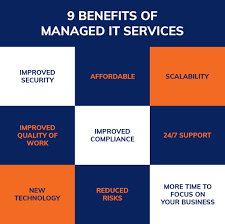Do you have a fully-fledged IT department? Don’t sweat, there is managed services.

Sample this: You have a start-up or a small office and you don’t have a budget to hire different specialized information technology (IT) professionals to take care of your network management, software management, cloud administration and IT maintenance. You might as well be running a large organization and you realize that running a large IT department is not only denting your bottom line but is also becoming inefficient and ineffective. Given that IT field is wide and diverse, some IT resources will be idling when not needed. For instance, computers don’t need maintenance all year round, neither is cloud, network and security administration a daily affair. Managing and keeping internal IT operations running smoothly can be costly, time consuming and complicated. That is where managed services come in handy.
Managed services refer to the practice of outsourcing the responsibility for maintaining and anticipating the need for a range of processes and functions in order to improve operations and reduce expenses. In the context of IT and business, managed services often involve outsourcing the management of various aspects of a company’s technology infrastructure, applications, and support services to a third-party provider.

Some popular managed services include: Managed IT supportthis is where an organization outsources day-to-day IT support and help desk services. An organization might also elect to outsource cybersecurity tasks such as threat detection, incident response, and vulnerability management that is referred as managed security services. Managed cloud services is where an organization outsources the management of cloud infrastructure and services. Finally, there is managed network services where an organization outsources the monitoring and maintenance of a company’s network infrastructure.
There are slew of benefits that comes with engaging a competent managed services provider (MSP), among them being cost saving and budget control. MSPs often operate on a subscription or contract basis, providing predictable and consistent costs. This helps organizations manage their budgets more effectively compared to the variable costs associated with reactive, break-fix IT services. Outsourcing IT tasks can be more cost-effective than hiring and training an in-house team, especially for specialized skills. Also, by outsourcing non-core functions like IT management, organizations can concentrate on their core competencies and strategic goals, improving overall productivity. Focus on your business while they focus on theirs.

Roping in an experienced managed service provider ensures you have access to expertise and latest technologies. This is because MSPs are typically experts in their field, offering a level of expertise that may be challenging for an internal team to match. They also stay updated on the latest technologies and industry best practices, ensuring that clients benefit from state-of-the-art solutions. The organization will no doubt have enhanced reliability and performance when they sign up the Service Level Agreements (SLAs). TheSLAs define performance metrics and service levels, ensuring that the MSP is accountable for meeting agreed-upon standards. This can lead to improved reliability and performance of IT systems. Not to forget also that the organization stands to benefit from the MSP specialized team to improve significantly the cyber security posture, have the scalability and flexibility to wriggle round services and solutions. And when you talk about regulatory compliance like GDPR and HIPAA,MSPs with expertise in specific industries can assist organizations in achieving and maintaining compliance with the regulations and standards.
Overall, managed services provide a strategic approach to IT management, offering a range of benefits that contribute to the overall success and resilience of an organization.
 | Murithi MAGIRI, The writer is the Lead IT Consultant at Magtech Solutions [email protected] |
